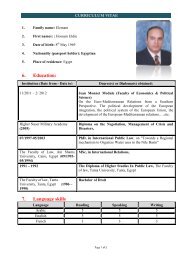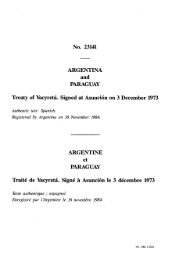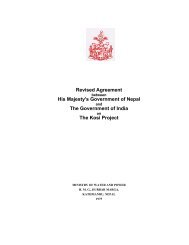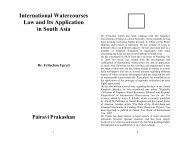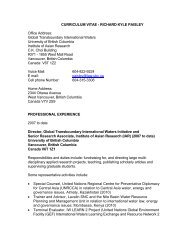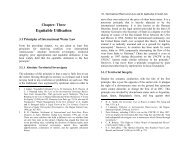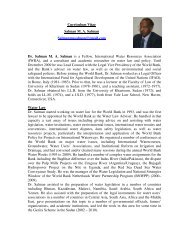Equitable Utilisation / 119 120 / <strong>International</strong> <strong>Watercourses</strong> <strong>Law</strong> <strong>and</strong> <strong>Its</strong> <strong>Application</strong> in South Asiabetween France <strong>and</strong> Spain held a similar view (alreadydiscussed above). However, it rejected Spain’s contention thatunder customary international law, France is compelled not toinitiate any work on the disputed watercourse until it hasreceived the consent from Spain. 44 The ICJ has explicitlysupported the view in numerous cases that states are under theobligation to consult <strong>and</strong> negotiate in the event of any conflictwhatsoever in undertaking any project on an IWC. 45There are some extreme instances, however, where the duty toconsult has been explicitly ignored or knowingly violated. Forinstance, the Jordan River Diversion scheme of 1953unilaterally proposed by the Arabs <strong>and</strong> aiming to harmprovoked a war in 1967, with Israel military damaging theArabs diversion work. 46 The Chicago diversion that involvedthe transfer of waters from the Great Lake Basin to theMississippi River basin by the USA in Chicago causedsignificant harm to Canada. 47 The Farakka Barrage unilaterallyconstructed by India in 1961, 48 caused much harm to EastPakistan. Besides, which India's temporary interruption of theIndus waters to Pakistan was also against those laws. 49 Turkeytemporarily interrupted the entire flow of the Euphrates <strong>and</strong>44 Supra note 8, pp. 166-167.45 North Sea Continental Shelf Cases (1969), Fisheries Jurisdiction(1974) <strong>and</strong> Gavcikovo-Nagymaros case (1997).46 Supra note 13, p. 57; also see supra note 11, p. 68.47 Supra note 6 p. 221; also see P. K. Wouters, "Allocation of the Non-Navigational use of <strong>International</strong> <strong>Watercourses</strong>: Efforts at Codification<strong>and</strong> the Experience of Canada <strong>and</strong> the United States" (1992) in XXXCYBIL, pp. 60-63: This diversion has remained a bitter experience forthe two nations.48 Supra note 9, p. 379, also see C. K Sharma, Water <strong>and</strong> EnergyResources of the Himalayan Block, Kathm<strong>and</strong>u: S. Sharma, 1983, p.278; also see B. Crow, A. Lindquist & D. Wilson, Sharing the Ganges,The Politics <strong>and</strong> Technology of River Development, New Delhi: SagaPub., 1995, p. 66.49 Y. Claude Acceriez, “The Legal Regime of the Indus” in R. Zacklin &L. Caflisch (eds), The Legal Regime of <strong>International</strong> Rives <strong>and</strong> Lakes,Dordrecht: Martinus Nijhoff Pub., 1981, pp. 396-397.Tigris for 27 days in order to fill up the Ataturk Reservoir,which escalated the tension with further downstream countries,Syria <strong>and</strong> Iraq in 1990. However, a trilateral meeting held laterin Ankara was able to sort out the problem. 50Apart from these exceptional instances, watercourse states areusually willing to try to settle their disputes throughconsultation <strong>and</strong> negotiation. State practices suggest thisnotion. 51 The UNCIW stipulates in its Article 8, the generalobligation to cooperate; Article 9, the regular exchange of data<strong>and</strong> information; <strong>and</strong>, Article 10, the relationship betweendifferent kinds of uses. In the event of conflict on the uses of anIWC, it shall be resolved with reference to Articles 5 to 7, withspecial regard to the requirement of vital human needs. Part IIIon planned measures, from Articles 11 to 19, explicitly assertsthe procedural underpinnings of negotiation, exchange of data<strong>and</strong> statistics. The aim of those procedural rules are to informabout the proposed project in detail, notify, <strong>and</strong> respond to thepossible effect of such use, the time being fixed as six monthsfor completing the notification <strong>and</strong> making objections (if any),<strong>and</strong> replying to notification. The consequence of not respondingto notification is that the state in default cannot raise objectionsto the proposed scheme. The process of consultation <strong>and</strong>negotiation concerning planned measures <strong>and</strong> urgentimplementation of planned measures is also dealt with. Thecore of these procedural underpinnings is to encourage thetransparency of a proposed project <strong>and</strong> to ensure that it is formaximising the benefits with no significant adverse effects to50 J. Kollars, "Problems of <strong>International</strong> River Management: The Case of theEuphrates” A. K. Biswas (ed), <strong>International</strong> Waters of the Middle East Fromthe Euphrates Tigris to Nile, Oxford: Oxford University, 1994, pp. 48-49: GAP(Turkish acronym), Turkey's South Anatolia Development Project, whichincorporates construction of 21 dams <strong>and</strong> 19 hydropower projects. One millionhectares of l<strong>and</strong> are scheduled to be irrigated with water from the Euphrates<strong>and</strong> 625,000 hectares from the Tigris river waters, a total of 7500 MW installedcapacity of hydroelectricity with an average annual production of 2.6 billionkwh. This in turn represents 19% of the 8.5 million ha of the economicallyirrigable l<strong>and</strong> in Turkey <strong>and</strong> 20.5% of the country's hydropower.51 Ibid.
Equitable Utilisation / 121 122 / <strong>International</strong> <strong>Watercourses</strong> <strong>Law</strong> <strong>and</strong> <strong>Its</strong> <strong>Application</strong> in South Asiathe other watercourse states. Other elements includecooperation between watercourse states in the event of anyinjury, the obligation to mitigate, avert or eliminate such injuryor, alternatively, the payment of reparation in case of injuryinflicted. Excluding some exceptional instances, co-basin orwatercourse states are usually willing to try to settle their waterdisputes by consultation <strong>and</strong> negotiation. 523.3.2 Discharge of DutyThe basic element of the <strong>Law</strong> of Treaties is to ensure that theparties will implement the provisions of a treaty in good faith. 53Judge Lauterpacht adopted the good faith concept in theNorwegian Loan Case, where he propounded: “unquestionably,the obligation to act in accordance with good faith, being ageneral principle of law, is also part of international law.” 54Similarly, in Interh<strong>and</strong>el he spoke of "the abiding duty of everystate is to act in good faith." 55 In the North Sea ContinentalShelf judgement the ICJ accepted this view, it was based on theequitable principle for delimiting the Continental Shelf betweenadjacent states on “a foundation of very general precepts ofjustice <strong>and</strong> good faith.” 56 It further states:"… the parties are under an obligation to enter intonegotiations with a view to arriving at an agreement<strong>and</strong> not merely to go through a formal process ofnegotiation; … they are under an obligation so to52 Of the 253 treaties on the non-navigational use of international rivers includedin the volume prepared by the Secretariat at the United Nations <strong>and</strong> publishedin early 1960 at least 116 indicate that no undertaking will be carried out whichmake any change in the regime of a river without the consent of the othercountry. E. Fano," Brief Comments on the United Nations Water Conference"in Albert E. Utton <strong>and</strong> L. Teclaff (eds), Water in Developing World, Colorado:Westview Press, 1978, pp. 267-269.53 Article 26 of the Vienna Convention on <strong>Law</strong> of Treaties, 8 ILM (1969)p. 685.54 ICJ Reports 9, (1957) p. 53.55 ICJ Reports 6, (1959) p. 113.56 ICJ Reports 3, (1969) pp. 46-47.conduct themselves that the negotiations aremeaningful, which will not be the case when either ofthem insists upon its own position withoutcontemplating any modifications of it…" 57The principle of good faith requires states subject to this duty tocontinue consultation <strong>and</strong> negotiation until they reach anagreement. The PCIJ in its advisory opinion of October 18,1931 concerning the Railway Traffic case between Pol<strong>and</strong> <strong>and</strong>Lithuania stated:"… an obligation to negotiate does not imply anobligation to reach an agreement, nor in particulardoes it imply that Lithuania, by undertaking tonegotiate, has assumed an agreement, <strong>and</strong> is inconsequence obliged to conclude the …agreements." 58Later, in a case where the same approach was taken by the ICJ,in its advisory opinion on The Status of South-West Africa, thecourt denied that a state which has assumed an obligation tomake an agreement with another state was in fact under anobligation to reach an agreement with it. The court had furthermade it clear that the parties must be free to accept or reject theterms of a contemplated agreement. No party should impose itsterms on another party. 59The ICJ in the Gavcikovo-Nagymoros case again endorsed theprinciple. 60 Articles 8 & 9 of the UNCIW state the sameprovision between watercourse states. Whilst carrying out anyproject in an IWC, Articles 11-19 have stipulated detailedprovisions, as briefly discussed above. These provisions spell57 Ibid. p. 47.58 PCIJ Ser.A/ NO 42, (1931), p. 116; also see Bourne, supra note 42, pp.225-226.59 ICJ Reports (1950) pp. 128 &139.60 37 ILM, (1998), para. 78, p. 190.



